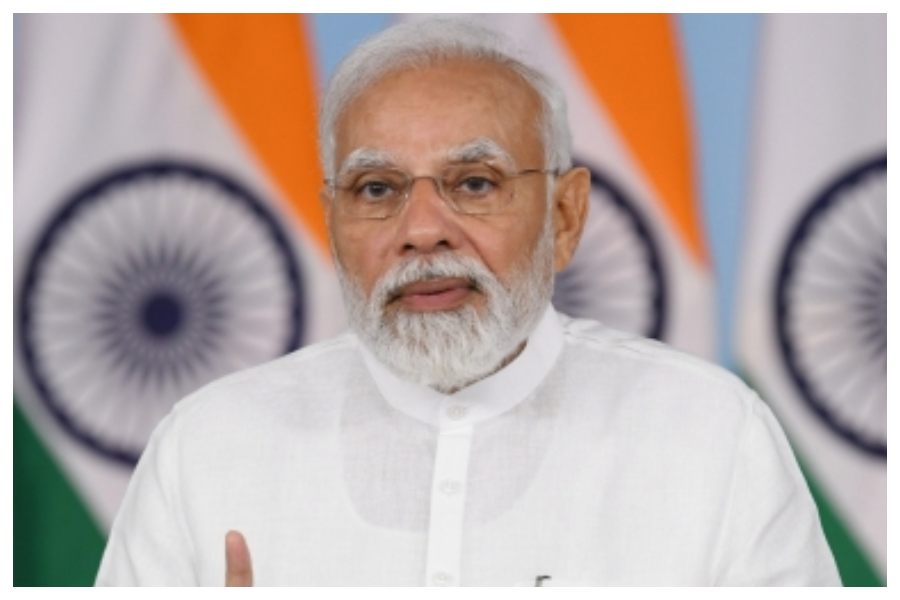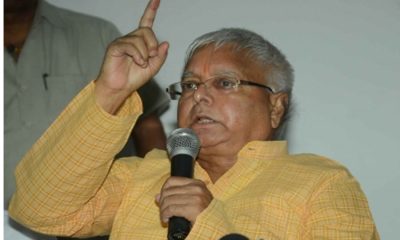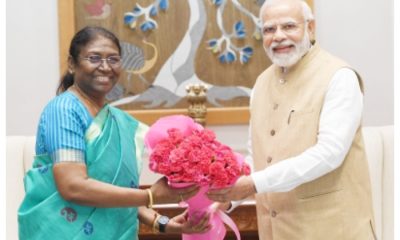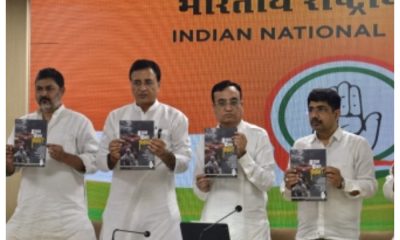National News
8 years ago we started implementing new mantras of good governance in India: Modi

Prime Minister Narendra Modi on Friday said that eight years ago his government started implementing new mantras of good governance in India following the path of minimum government – maximum governance.
Prime Minister Modi was speaking after inaugurating India’s biggest Drone Festival — ‘Bharat Drone Mahotsav 2022’ here. He also interacted with Kisan drone pilots, witnessed open-air drone demonstrations and interacted with startups in the drone exhibition centre.
The Prime Minister talked about his fascination and interest in the drone sector and said that he was deeply impressed by the drone exhibition and the spirit of the entrepreneurs and innovation in the sector. The Prime Minister also talked about his interaction with farmers and young engineers. “The energy and enthusiasm in the drone sector are visible and indicate India’s strength and desire to leapfrog into a leading position. The sector shows great possibilities of a major sector for employment generation,” he said.
The Prime Minister said, “This was the time eight years ago when we started implementing new mantras of good governance in India. Following the path of minimum government, and maximum governance, we have made ease of living, and ease of doing business a priority. We connected every citizen of the country with the facilities and welfare schemes by moving forward on the path of ‘Sabka Saath Sabka Vikas’.”
The Prime Minister pointed out that during the earlier governments, technology was considered part of the problem and efforts were made to portray it as anti-poor and due to this, there was an atmosphere of indifference regarding the use of technology in governance before 2014.
“Technology could not become part of the mood of governance. The poor, the deprived, and the middle class suffered the most due to this,” he said.
He also mentioned the complicated procedures for availing of basic facilities leading to a sense of deprivation and fear.
“Progress is possible only when we change with time. Technology has helped a lot in furthering the vision of saturation and in ensuring last-mile delivery. And I know that we can achieve the goal of Antyodaya by moving forward at this pace and are able to provide the poor segment with their entitlement by the use of Jan Dhan, Aadhar, Mobile (JAM) trinity. Experience of the last eight years further strengthens my belief,” he said.
The Prime Minister noted that his government has made technology a key tool to impart new strength, speed and scale to the country.
The Prime Minister informed the gathering that today with the help of the Robust UPI framework developed by the country, lakhs of crores of rupees are being transferred directly to the bank account of the poor. Women, farmers, and students are now getting help directly from the government.
He cited PM Swamitva Yojana as an example of how drone technology is becoming the basis of a major revolution. Under this scheme, for the first time, every property in the villages of the country is being digitally mapped and digital property cards are being given to the people.
“Promotion of drone technology is another medium of advancing our commitment to good governance and ease of living. In the form of drones, we have got a smart tool that is going to be part and parcel of common people’s lives,” he said.
The Prime Minister highlighted the importance of drone technology in the fields of defence, disaster management, agriculture, tourism, film and entertainment.
“Drone technology is going to play a major role in empowering farmers and modernising their lives,” he added.
Crime
Thane Crime Branch Busts Major Drug Racket, Seizes 638 Kg Ganja Worth ₹2.04 Crore, One Arrested

Thane: The Thane crime branch has arrested a 36-year-old man and seized 638 kg of marijuana worth about ₹2.04 crore during an operation on December 30.
The accused has been identified as Chinna Tagur Laxman Nayak, a resident of Mehabubnagar district in Telangana, who would often ferry the drugs from Odisha and Telangana to the city.
Acting on a tip-off, the property cell of the crime branch learned that a large drug consignment was being brought to Thane. A trap was laid at Kharegaon toll naka in Kalwa on the Mumbai–Nashik highway, and the police intercepted an Innova and found 638 kg of ganja hidden inside the vehicle. The drugs are estimated to be worth ₹2.04 crore in the illicit market.
The accused has been booked under relevant sections of the Narcotic Drugs and Psychotropic Substances (NDPS) Act. He was produced before a local court and has been remanded to police custody till January 3.
We suspect that an entire gang is operating in the region, and we will soon trace the remaining members- Amarsinh Jadhav
Amarsinh Jadhav, deputy commissioner of police (Crime), said , “Our team is investigating further to identify the source of the contraband and the individual to whom the consignment was to be delivered. We suspect that an entire gang is operating in the region, and we will soon trace the remaining members.”
Business
New labour codes bring on board gig workers with 90-day employment

New Delhi, Jan 2: The Ministry of Labour and Employment has published the draft rules for the four labour codes, which also bring gig workers on board for various benefits such as minimum wage, health, occupational safety, and social security coverage.
The government has invited feedback from stakeholders on these draft rules and aims to finally roll out the entire package of four labour codes across the country from April 1.
Under the draft rules, in order to be eligible for the benefits, a gig or platform worker must be associated with an aggregator for at least 90 days in a financial year to qualify for social security benefits created by the Centre. If a worker is engaged with more than one aggregator, the minimum requirement is fixed at 120 days.
The notification, dated December 30, 2025, was issued a day before the gig and platform workers went on a flash strike for higher wages and better working conditions.
The rules clarify that a worker is considered “engaged” on any calendar day if they earn income for work done for an aggregator, regardless of how much they earn.
If a worker is associated with multiple aggregators, the number of engagement days will be added together across all aggregators. The draft also states that if a worker is engaged with three aggregators on the same calendar day, it will be counted as three separate days of engagement.
Regarding the minimum wage, the draft rules state that when the rate of wages for a day is fixed, then such amount shall be divided by eight for fixing the rate of wages for an hour and multiplied by twenty-six for fixing the rate of wages for a month. In case of a five-day working week, the hourly rate of minimum wages so calculated shall be used to derive the minimum wages for the day.
While fixing the minimum rates of wages, the Central government shall take into account the geographical area, experience in the area of employment, and level of skill required for working under the categories of unskilled, semiskilled, skilled, and highly skilled, the rules further state.
The four codes — the Code on Wages, 2019; the Industrial Relations Code, 2020; the Code on Social Security, 2020; and the Occupational Safety, Health and Working Conditions Code, 2020 — were notified on the same day.
The Labour Codes make it mandatory for employers to issue appointment letters to all workers, which provides written proof to ensure transparency, job security, and fixed employment. Earlier, no mandatory appointment letters were required.
Under the Code on Social Security, 2020, all workers, including gig and platform workers, will get social security coverage. All workers will get PF, ESIC, insurance, and other social security benefits. Earlier, there was only limited security coverage.
Under the Code on Wages, 2019, all workers will receive a statutory minimum wage payment, and timely payment will ensure financial security. Earlier, minimum wages applied only to scheduled industries or employments and large sections of workers remained uncovered.
National News
‘How Does It Matter…’: AIMIM’s Waris Pathan Reacts To KKR Signing Bangladesh’s Mustafizur Rahman In IPL Auction.

Mumbai: With political controversy erupting over Kolkata Knight Riders (KKR) selecting Bangladeshi fast bowler Mustafizur Rahman for the upcoming Indian Premier League (IPL) 2026 season, AIMIM national spokesperson Waris Pathan pointed out that earlier the Indian government had permitted India–Pakistan cricket matches despite strained relations. “When it comes to cricket, how does it matter who supports what?” Pathan said
Though Pathan condemned the atrocities against Hindus in Bangladesh, he added that earlier India suffered greatly due to terrorism, yet matches were still played for commercial reasons.
“We had objected to it because Pakistan has been the biggest propagator of terrorism, and India has greatly suffered because of it… In Pahalgam, they came and killed innocent tourists in the name of religion. India still played a match against Pakistan for money.”
Speaking of his stand on the current KKR selecting Bangladeshi player, Pathan said, “I reject money that puts my country’s pride and dignity into question.”
Shiv Sena leader Sanjay Nirupam urged actor and KKR co-owner Shah Rukh Khan to reconsider the decision, arguing that removing the Bangladeshi player would be “for his own good” and in the interest of the country.
He claimed that with public anger directed at Bangladesh over recent developments, any association with Bangladeshi nationals could provoke backlash.
“When the entire country is enraged and angry at Bangladesh, anyone in India who has even the slightest connection to Bangladeshis could become a target of that anger,” he added.
India and Bangladesh share long-standing diplomatic, cultural and economic ties, with cooperation across trade, connectivity, and security. However, the relationship has seen periods of strain in recent times due to political developments and security concerns in the region. There have been instances of violence against Hindus in the country in recent times.
-

 Crime3 years ago
Crime3 years agoClass 10 student jumps to death in Jaipur
-

 Maharashtra1 year ago
Maharashtra1 year agoMumbai Local Train Update: Central Railway’s New Timetable Comes Into Effect; Check Full List Of Revised Timings & Stations
-

 Maharashtra1 year ago
Maharashtra1 year agoMumbai To Go Toll-Free Tonight! Maharashtra Govt Announces Complete Toll Waiver For Light Motor Vehicles At All 5 Entry Points Of City
-

 Maharashtra1 year ago
Maharashtra1 year agoFalse photo of Imtiaz Jaleel’s rally, exposing the fooling conspiracy
-

 National News1 year ago
National News1 year agoMinistry of Railways rolls out Special Drive 4.0 with focus on digitisation, cleanliness, inclusiveness and grievance redressal
-

 Maharashtra1 year ago
Maharashtra1 year agoMaharashtra Elections 2024: Mumbai Metro & BEST Services Extended Till Midnight On Voting Day
-

 National News1 year ago
National News1 year agoJ&K: 4 Jawans Killed, 28 Injured After Bus Carrying BSF Personnel For Poll Duty Falls Into Gorge In Budgam; Terrifying Visuals Surface
-

 Crime1 year ago
Crime1 year agoBaba Siddique Murder: Mumbai Police Unable To Get Lawrence Bishnoi Custody Due To Home Ministry Order, Says Report




















